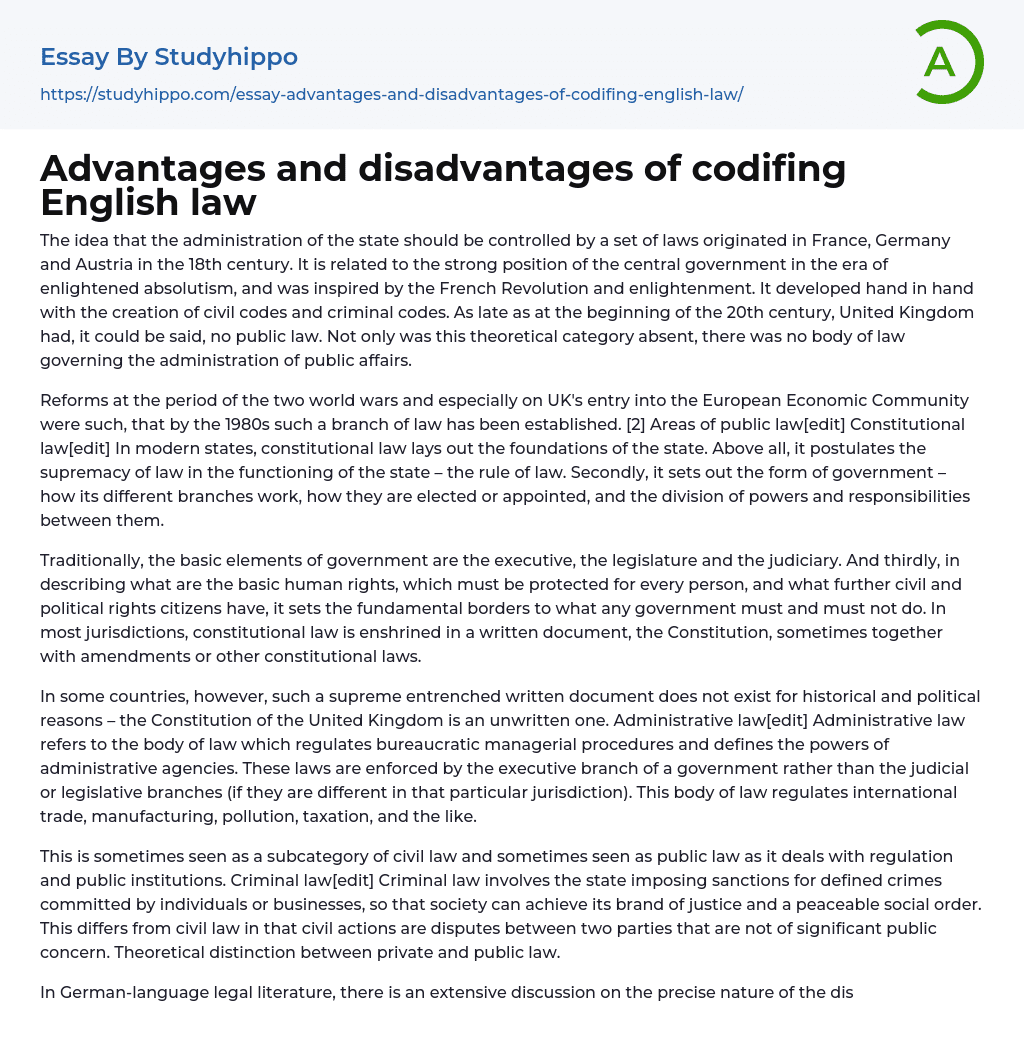

Advantages and disadvantages of codifing English law Essay Example
In the 18th century, France, Germany, and Austria introduced laws to govern their states. These laws were influenced by enlightened absolutism and inspired by the French Revolution and enlightenment. They were developed alongside civil and criminal codes. Strangely, the United Kingdom lacked a public law or legal framework for regulating public affairs until the early 20th century.
In the 1980s, a legal discipline emerged due to reforms implemented during World War I and II and the United Kingdom's accession to the European Economic Community. This discipline encompasses different aspects of public law, including constitutional law. Constitutional law is vital in establishing a nation's fundamental principles and structures. It ensures adherence to the rule of law and governs a country, determining government systems, branch functions and selection processes, as well as allocating powers and responsibilities among them.
The execu
...tive, legislature, and judiciary are the customary elements of government. It also establishes the fundamental human rights that all individuals must be protected and defines the civil and political rights given to citizens, thereby outlining the limits that any government must follow. In numerous legal systems, constitutional law is documented in a paper known as the Constitution, occasionally enhanced with amendments or other constitutional laws.
Certain countries lack a supreme entrenched written document for historical and political reasons, like the United Kingdom's Constitution, which is unwritten. Administrative law governs bureaucratic managerial procedures and determines the authorities of administrative agencies. The executive branch enforces these laws instead of the judicial or legislative branches, if they exist separately in that jurisdiction. These laws regulate international trade, manufacturing, pollution, taxation, and similar matters.
The text
can beand unified as follows: Criminal law, which falls under both civil law and public law, is concerned with regulating public institutions and imposing sanctions on individuals or businesses for committing specific crimes. By doing so, society aims to achieve its own form of justice and maintain a peaceful social order. Unlike civil law, which involves disputes between two parties that are not of significant public concern, criminal law deals primarily with actions that have an impact on the broader community. This illustrates the theoretical distinction between private and public law.
A comprehensive discussion exists in German legal literature regarding the exact distinction between public law and private law. Various theories have emerged, which are not exhaustive, mutually exclusive or separate from one another. The interest theory, developed by the Roman jurist Ulpian, states that "Publicum ius est, quod ad statum rei Romanae spectat, privatum quod ad singulorum utilitatem" (Public law is that which concerns the Roman state, private law is concerned with the interests of individuals). However, this theory is weak because many matters of private law also impact the public interest.
The concept of public interest is often questioned. The subjection theory aims to explain this distinction by highlighting the subordination of individuals to the state. Public law governs this relationship, while private law governs relationships where parties are considered equals. However, the subjection theory falls short in areas like employment law, which is typically categorized as private law but still involves subordination. Moreover, the modern state can be involved in relationships where it is seen as equal to an individual.
The subject theory examines the significance of the law's subject
in a legal relationship. If the subject is a public individual, such as a member of a public entity like a state or municipality, public law is applicable. Conversely, private law applies when the subject is not a public person. By merging both subjection theory and subject theory, one can establish a practical differentiation. According to this perspective, a field of law qualifies as public law when it involves a public authority possessing unilateral power to act (imperium) and utilizing said power within the given relationship.
Simply put, the classification of a public authority as either a public or private entity determines its actions, even when it comes to tasks like ordering office supplies. This theory views public law as a distinct subset of private law. Certain legal areas, like employment law, don't neatly fit into either category. For instance, elements like the employment contract resemble private law, while aspects like workplace safety investigations align more with public law.
The distinction between public and private law has a significant impact on legal practice as it determines the division of competences between courts and administrative bodies. In the Austrian constitution, federal legislation has exclusive authority over private law, while state legislation partially governs public law.
- Business Law essays
- Contract essays
- Consumer Protection essays
- Property essays
- Ownership essays
- Agreement essays
- Common Law essays
- Contract Law essays
- Justice essays
- Security essays
- Tort Law essays
- United States Constitution essays
- Crime essays
- Lawsuit essays
- Treaty essays
- Family Law essays
- Marijuana Legalization essays
- Constitution essays
- War on Drugs essays
- Court essays
- Jury essays
- Police essays
- Protection essays
- Community Policing essays
- Criminal Law essays
- Judge essays
- Lawyer essays
- Employment Law essays
- Copyright Infringement essays
- Injustice essays
- Intellectual Property essays
- Breach Of Contract essays
- Jurisprudence essays
- Social Injustice essays
- Juvenile Justice essays
- Internet Privacy essays
- Cyber Security essays
- Bill Of Rights essays
- Civil Liberties essays
- First Amendment To The United States Constitution essays
- Fourth Amendment To The United States Constitution essays
- Second amendment essays
- Animal Cruelty essays
- Law Enforcement essays
- Juvenile Justice System essays
- Surveillance essays
- Forensic Science essays
- Crime Prevention essays
- Criminal Justice essays
- Criminology essays



